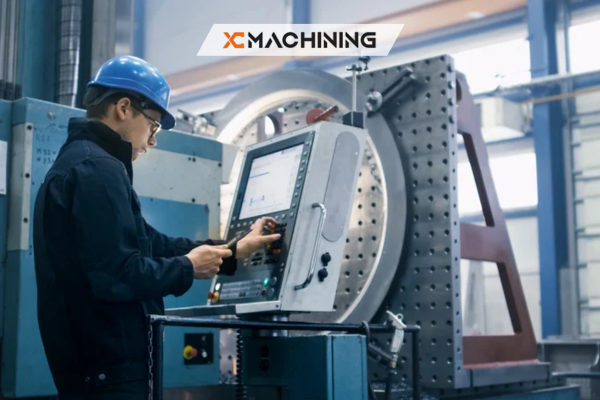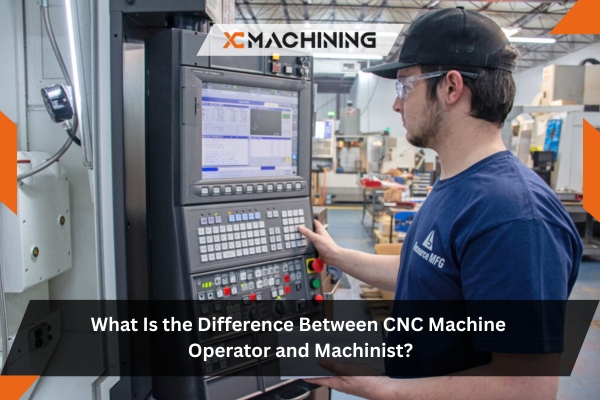Manufacturing’s huge in America – we’re talking 12.8 million workers. And a big chunk? CNC machine operator job titles. After spending years on shop floors and training centers, the difference between cnc operators and machinists becomes crystal clear.
Both work with computer numerically controlled equipment, sure. But their duties? Totally different game. Department of Labor says both have solid job outlook through 2033, so if you’re considering a new career, this insight from manufacturing professionals might interest you.
What Is a CNC Machine Operator
A CNC machine operator basically runs pre-programmed computer numerical control equipment. Making parts that match exact specifications. Entry-level position, but it’s where most people start in precision manufacturing – seen hundreds of operators begin this way.
Most operators learn through hands-on training. Real workplace experience builds those skill sets better than any textbook.
Daily Responsibilities
What’s the cnc operator job description look like day-to-day? They’re stocking raw materials, watching operation of cnc machinery, and making sure to inspect finished products. Their job is to load components, spot problems, report issues. Walk into any shop and you’ll see this pattern.
Basic stuff includes cleaning cnc machines, swapping cutting tools, routine maintenance. Simple? Maybe. Critical? Absolutely.
Required Skills and Training
Good news – high school gets you started with entry-level positions when you’re new to cnc operations. Most employers handle on-the-job training through certificate programs. Usually takes weeks, maybe months. The National Institute for Metalworking Skills confirms this training approach works best.
Skills needed: interpret blueprints, use measuring tools, attention to detail. That last one matters more than you’d think – seen too many good parts become scrap because someone rushed.
What Is a CNC Machinist
CNC machinists handle the complicated stuff. Setup, programming, troubleshooting – requires real technical knowledge. They supervise computer numerically controlled tool operators, manage whole production cells. According to the Society of Manufacturing Engineers, these roles demand comprehensive understanding of materials science and cutting theory.
Experience matters here. Different materials, cutting tools, machining processes – they know it all.
Advanced Responsibilities
CNC machinists operate computer-controlled tools with G-code and computer-aided manufacturing software. Duties of a cnc machinist include picking cutting tools, setting machining parameters, optimizing efficiency. Most facilities rely on these decisions to maintain production targets.
Complex problems? They analyze and fix them fast. No luxury of calling maintenance when a $50,000 part is at stake.
Education and Experience Requirements
Most machinist spots want 2-4 years experience plus formal technical training programs. Community colleges, trade schools, apprenticeships – structured paths for those looking to become a cnc setup operator. The Manufacturing Institute reports these programs show 85% job placement rates.
Advanced jobs might need software knowledge like Mastercam or SolidWorks. Worth the investment – software skills separate good machinists from great ones.

Key Differences Between CNC Machine Operator and Machinist
The operator vs machinist thing comes down to complexity, independence, technical knowledge.
| Factor | CNC Machine Operator | CNC Machinist |
| Experience | Entry-level | 3-5 years minimum |
| Programming | Basic operation | Advanced G-code programmer |
| Setup Tasks | Load stock material | Complete machine setup |
| Problem Solving | Report issues | Diagnose and resolve |
| Supervision | Receives direction | Provides leadership |
Programming Complexity
Cnc operators work with pre-programmed systems. Loading the program, minor adjustments. Machinists create original programs, modify existing ones.
CNC machining design tips become crucial for machinists optimizing modern manufacturing efficiency.
Decision-Making Authority
Operators set up and operate equipment following procedures. Limited deviation. Machinists make critical decisions – machining strategies, tool selection, process parameters.
Precision CNC Metal Machining requires balancing quality with production timelines.
Salary Comparison and Career Prospects
Money talk. Wage differences reflect skill levels and responsibilities. Location, industry, company size all affect compensation. From working with manufacturers nationwide, these patterns hold true consistently.
Occupational employment and wages data shows median annual salaries: $49,970 for cnc operators, $56,150 for machinists (May 2024). But experienced professionals in specialized fields often exceed these figures significantly.
| Position | Entry Level | Median Wage | Experienced |
| CNC Machine Operator | $32,000 | $49,970 | $62,000 |
| CNC Machinist | $42,000 | $56,150 | $75,000 |
Regional Variations
Manufacturing hubs – Michigan, Ohio, California – offer higher hourly wages. More demand. Aerospace and defense pay premium for specialized skills. Having worked with companies in these regions, the wage premiums are real and substantial.
Aluminum CNC machining specialists get higher wages in aerospace markets. Supply and demand basics.
Industry Applications
Both machine operators and machinists work across diverse manufacturing industry sectors. Different challenges, different opportunities.
Aerospace Manufacturing
Aerospace needs precision CNC Metal Machining for critical components. Engine parts, structural elements. Tight tolerances, exotic materials need advanced basic machining skills. Federal Aviation Administration standards make this among the most demanding sectors.
Quality requirements exceed most industries. Documentation, traceability add complexity – everything gets tracked from raw material to finished part.
Automotive Production
High-volume automotive uses automated systems, cnc machine operator for consistent production. Aluminum CNC machining increasingly important for vehicle lightweighting.
Machinists focus on tool optimization, process improvement. Work with production engineers for efficiency.
Medical Device Industry
Medical devices need exceptional cleanliness, precision. Both operators and machinists understand FDA regulations, quality systems.
Undercut Machining essential for complex implants, surgical instruments.
Custom Manufacturing Services
Companies like XC Machining serve diverse industries with flexible capabilities. Their comprehensive services cover prototyping to full production. (Note: mentioned for service examples – no commercial relationship.)
Operations need versatile workforce handling various materials, part geometry. CNC machining design tips crucial for custom production optimization.
Advanced Manufacturing Techniques
Modern manufacturing uses cutting-edge processes. Specialized knowledge helps both operator and machinist career advancement.
Multi-Axis Machining
Five-axis systems enable complex parts in single setups. Undercut Machining reduces secondary operations, improves accuracy.
Multi-axis programming requires understanding complex coordinates, tool orientation.
Automated Production Systems
Automation expanding industry-wide. Cnc machine operators work with robotic loading, automate quality inspection.
Machinists understand system integration, troubleshoot machine communication.
Career Advancement Pathways
Career in cnc needs continuous learning. Both operators and machinists stay current with technology.
Certification Programs
NIMS certification shows machining competency. Manufacturing Skills Standards Council offers advanced credentials. Community colleges have evening, weekend programs – scholarships and grants available.
Specialization Opportunities
Specializing creates advancement opportunities. Precision CNC Metal Machining valuable in aerospace, medical. Technicians specialize in lathe operations, grinder work.
Geographic specialization helps too. Manufacturing hubs accelerate growth.

Quality Control and Inspection
Quality assurance critical in manufacturing process. Both cnc machine operators and machinists handle product quality.
Measurement and Documentation
Operators use basic instruments – calipers, micrometers. Document results, alert supervisors about deviations.
Machinists use sophisticated equipment – coordinate measuring machines, optical comparators.
Statistical Process Control
Data-driven quality systems. Operators collect measurement data, machinists analyze for improvements.
Technology Integration
Technology evolving fast. Both operators and machinists adapt throughout careers.
Software Integration
Computer-aided manufacturing software streamlines programming, setup. Cnc machine operators interact with sophisticated interfaces.
Industry 4.0 Implementation
Smart manufacturing creates opportunities. Connected machines provide real-time data for optimization.
Conclusion
Both cnc machine operators and machinists offer solid manufacturing careers. Operators handle production support, build foundational skills. Machinists use advanced knowledge for process optimization.
Companies like XC Machining show how both skill levels matter. Growth needs continuous learning – Undercut Machining and precision CNC Metal Machining specializations create opportunities.
Frequently Asked Questions
What educational background helps someone become a CNC machine operator?
Most CNC machine operator positions need high school completion. Technical education in manufacturing gives hiring advantages. Community college programs include hands-on training with actual equipment.
How long does career progression from operator to machinist typically take?
Career advancement from CNC machine operator to machinist usually needs 2-4 years experience plus additional training. Formal education or apprenticeships can speed things up.
Which industries offer the best opportunities for CNC professionals?
Aerospace, automotive, medical device, defense manufacturing provide excellent opportunities for both CNC machine operators and machinists. These industries need precision CNC Metal Machining and offer competitive compensation.
Do CNC machine operators need programming knowledge initially?
Entry-level CNC machine operators typically don’t need programming skills. But learning basics improves advancement prospects. Understanding CNC machining design tips and G-code helps transition to machinist roles.
What certifications benefit CNC career advancement?
NIMS certification shows competency in areas like aluminum CNC machining and Undercut Machining. CNC machining design tips knowledge also enhances employment prospects through industry certifications.
Citations
- U.S. Bureau of Labor Statistics. (2024). Occupational Outlook Handbook: Machinists and Tool and Die Makers. Department of Labor. https://www.bls.gov/ooh/production/machinists-and-tool-and-die-makers.htm
- U.S. Bureau of Labor Statistics. (2024). Occupational Employment and Wage Statistics: Computer Numerically Controlled Tool Operators. Department of Labor. https://www.bls.gov/oes/2023/may/oes519161.htm
- National Institute for Metalworking Skills. (2024). CNC Machining Credentialing Standards. NIMS. https://www.nims-skills.org/
- U.S. Bureau of Labor Statistics. (2024). Employment Projections: Manufacturing Industry. Department of Labor. https://www.bls.gov/emp/
Manufacturing Institute. (2024). Manufacturing Workforce Development Report. National Association of Manufacturers. https://www.nam.org/





